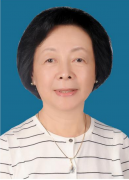个人简介
萧文鸾教授萧教授毕业于台湾大学植物病虫害学系,随后赴美深造,先后取 得美国密西根大学植物系、及哥伦比亚大学医学院人类遗传及发展学系硕士 及博士学位。其后在哥伦比亚大学医学院肿瘤研究所、加州大学尔湾分校生 物学院生化及分子生物学系从事肿瘤分子生物学的研究工作。一九九三年末 受聘于香港科技大学助理教授,二○○三年参加入浸会大学中医药学院至二 ○一四年。曾任香港浸会大学中医药学院教授及癌症炎症研究中心研究员, 前任学院副院长、教学部主任、及浸会大学中医药学院中医 及生物医学士学位课程主任。 萧教授对于肿瘤在基因层面的机理研究累积三十余年的经验、先后在 Nature、 Science、 Cells、 Molecular Cellular Biology、Oncogene、Cancer Research、Clinical Cancer Research、Carcinogenesis 等国际学术期刊发 表多篇研究报告。近年来更致力于中药抗癌及防癌机理的研究并获鼓舞成积, 近期更获香港研究资助局拨款,领导跨院校专家小组从事中药对肿瘤及代谢 失调症进行蛋白组学的研究, 并参与香港研究资助资的 AoE 鼻咽癌研究项目. 除此之外, 萧教授近期更进行一系列针对中药与肠菌相互关系的探讨, 该课 题获香港及澳门科技基金会资助。 除科研外,萧教授在推展香港高教的中医教育亦不遣余力。萧教授目前并担 任多项公职, 如香港工商及科技局, 通讯及科技科认証咨询委员会委员, 香 港创新科技基金生物科技项目评审委员, 美圝认养中国乡村图书馆基金会香 港地区联络人。目前为香港大学荣誉教授、香港学者协会主席、香港生物科 技恊会司库等职。 Wendy Hsiao, 2014 Academic Qualitfication: 1985, 美国哥伦比亚大学医学院博士1982, 美国哥伦比亚大学医学院硕士 1971, 美国密西根大学硕士 1968, 国立台湾大学学士 Previous academic positions: 2005-2014 香港浸会大学中医药学院教授 暨浸大中医药学癌症及炎症研究中心研究员 2008-2011 香港浸会大学中医药学院副院长 2005-2012 香港浸会大学中医药学院教学部主任2005-2014 香港浸会大学中医药学院教授 2003-2005 香港浸会大学中医药学院副教授 1994-2003 香港科技大学生物系助理教授 1987-1993 美国加州大学尔湾分校研究助理教授 1985-1987 美国哥伦比亚大学医学院肿瘤研究所研究员
研究领域
包括肿瘤分子生物学, 讯息传导, 致癌, 及防癌基因, 炎症, 癌症中药药理研究. 研究也涉及中药及天然药物与肠微生态相互作用
Patents (as the key inventor) Haynes, R.K., Lam, W.-L., Hsiao, W.-L.W. “The development of novel drugs through attachment of DNA-binding and other targeting ligands to trioxanes including artemisinin derivatives.” U.S. Patent No. 6,649,647, issued Nov 18, 2003. Hsiao WLW and Wong SCC. “Plasma or serum marker and process for detection of cancer” China Patent: W02004002294. Hsiao WLW and Wong SCC. “Plasma or serum marker and process for detection of cancer” US Patent granted, Oct 12, 2010, Patent No: US7,811,752 B2. Hsiao WLW; Tai, William Chi-Shing and Jiang, Zhi-hong “Using a novel high-throughput yeast cell-based screening platform to identify HMG-CoA reductase inhibitors from natural products” PCT patent application. US61/597,162. & Non-provisional patent application, US & China
近期论文
Five most representative publications in recent five years Wu P.K., Tai W.C.S., Liang Z.T., Zhao Z.Z. and Hsiao W.W.L*. Oleanolic acid isolated from Oldenlandia diffusa exhibits a unique growth inhibitory effect against ras-transformed fibroblasts. Life Sciences 85:113-12, 2009. Wendy Hsiao, 2014 Hsiao WLW* & Liu L. The role of Traditional Chinese Herbal Medicines in Cancer Therapy – from TCM Theory to Mechanistic Insights. Planta Medica 76: 1118-1131, 2010 (invited reviews). Pui Kei Wu, William C.S. Tai, Roy C.Y. Choi, Karl W.K.Tsim, Hua Zhou, Xin Liu, Zhi-Hong Jiang, and W.L.Wendy Hsiao*. Chemical and DNA authentication of taste variants of Gynostemma pentaphyllum herbal tea. Food Chemistry 128: 70-81, 2011. Tsang TF, Ye Y, Tai CS, Chou GX, Leung AKM, Yu ZL, Hsiao WL*. Inhibition of the p38 and PKA signaling pathways is associated with the anti-melanogenic activity of Qian-wang-hong-bai-san, A Chinese herbal formula, in B16 cells”. Journal of Ethnopharmacology, (doi:10.1016/j.jep.2011.08.043) 2011. Hiu-Yee Kwan, Zhijun Yang, Yong-Mei Hu, Wang-Fun Fong, Zhi-Ling Yu* and Wen-luan Wendy Hsiao*. The anti-cancer effect of oridonin is mediated by fatty acid synthase suppression in human colorectal cancer cells. J Gastroenterology 48: 182-192, 2013. Five representative publications beyond the recent five-year period Gattoni-Celli S, Hsiao WL, Weinstein IB. Rearranged c-mos locus in a MOPC 21 murine myeloma cell line and its persistence in hybridomas. Nature 306:795-796, 1983. Hsiao WLW, Gattoni-Celli S, Weinstein IB. A tumor promoter enhances oncogene-induced transformation of C3H 10T1/2 cells, Science 226:552-555, 1984. Housey GM, Johnson MD, Hsiao WLW, O'Brian CA, Murphy JP, Kirschmeier P, Weinstein IB. Overproduction of protein kinase C causes disordered growth control in rat fibroblasts. Cell 52: 343-54, 1988. Hsiao WLW, Housey GM, Johnson MD, Weinstein IB. Cells that overproduce protein kinase C are more susceptible to transformation by an activated c-Ha-ras oncogene. Mol. Cell. Biol. 9:2641-47, 1989. Yam JWP, Chan KW Hsiao WLW. Transcriptional regulation of the promoter of the rat frizzled related protein gene by CREB. Oncogene 22: 3901-3910, 2003.

